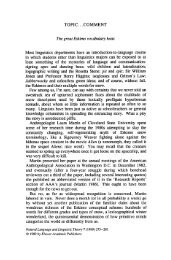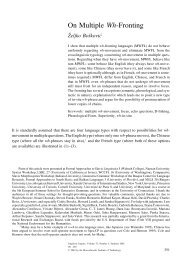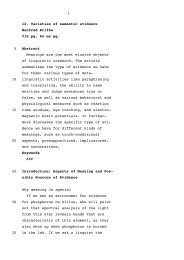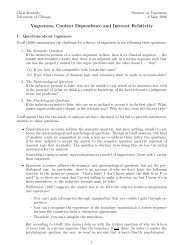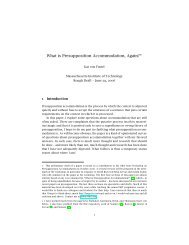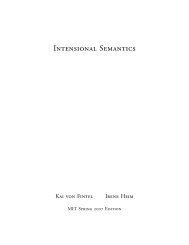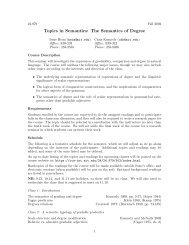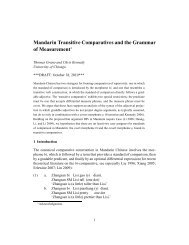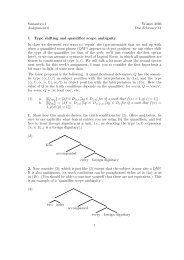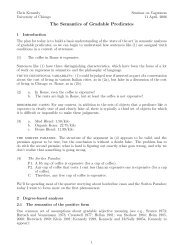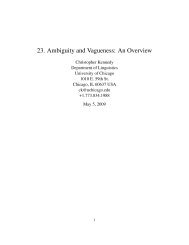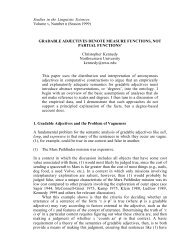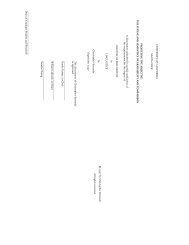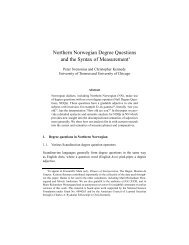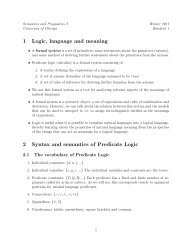On the natural history of negative polarity items - Syntax, Semantics ...
On the natural history of negative polarity items - Syntax, Semantics ...
On the natural history of negative polarity items - Syntax, Semantics ...
You also want an ePaper? Increase the reach of your titles
YUMPU automatically turns print PDFs into web optimized ePapers that Google loves.
Elena Castroviejo<br />
Gradation in modified APs<br />
INTRODUCTION: Some research has been conducted on manner modification <strong>of</strong> stative predicates<br />
(Maienborn, 2005; Geuder, 2006; Katz, 2008), but less attention has been paid to APs<br />
modified by deadjectival Advs (Ernst, 2011). The goal <strong>of</strong> this talk is to present a compositional<br />
analysis <strong>of</strong> graded modified APs such as how/so extremely expensive. While <strong>the</strong> presence<br />
<strong>of</strong> extreme Advs (extremely, unbelievably, surprisingly) has been used as an indication<br />
<strong>of</strong> exclamativehood (Elliott, 1974; Zanuttini and Portner, 2003), previous literature (D’Avis,<br />
2002; Castroviejo, 2008) does not provide a satisfactory fleshed-out compositional analysis<br />
that explains <strong>the</strong> interpretations delivered by <strong>the</strong> AP depending on <strong>the</strong> characteristics <strong>of</strong> <strong>the</strong><br />
Adv and <strong>the</strong> A ((1)), why certain degree expressions can intensify <strong>the</strong>se APs and o<strong>the</strong>rs cannot<br />
((2)), why mid-scale Advs are not possible in this configuration ((3)), and why intensified<br />
wh-interrogatives seem unacceptable ((4)).<br />
(1) a. I can’t believe how extremely expensive this laptop is.<br />
b. I know how politically incorrect this decision is.<br />
c. How beautifully phrased <strong>the</strong>se lyrics are!<br />
(2) a. I didn’t think this laptop would be so extremely expensive.<br />
b. #I didn’t think this laptop would be very extremely expensive.<br />
(3) #How fairly/reasonably/slightly long he can stay under water! (From Elliott 1974)<br />
(4) #How extremely expensive was this laptop?<br />
This paper argues that (a) <strong>the</strong> core A <strong>of</strong> extreme Advs denotes a property <strong>of</strong> degrees, (b)<br />
extreme Advs are <strong>the</strong>mselves gradable, so <strong>the</strong>y introduce an additional degree variable to be<br />
bound, (c) how and so target a degree variable, but, unlike very, too, etc., <strong>the</strong>y do not impose<br />
any truth-conditional restrictions on it, and (d) <strong>the</strong> phrase how/so Adv A has two possible<br />
bracketings and, correspondingly, two potential interpretations, even though <strong>the</strong>ir availability<br />
hinges on whe<strong>the</strong>r or not <strong>the</strong> A and <strong>the</strong> Adv are gradable.<br />
PROPOSAL: Extreme Advs function like manner Advs, but <strong>the</strong>ir core A denotes a property <strong>of</strong><br />
degrees ra<strong>the</strong>r than a property <strong>of</strong> states or events ((5)). For instance, a degree can be extreme,<br />
surprising or unbelievable (but see Katz 2005; Nouwen 2005 for a qualification).<br />
(5) a. [[extremely]]: lAlx.9d[A(x,d) & extreme(d)]<br />
b. [[extremely expensive]]: lx.9d[expensive(x,d) &extreme(d)]<br />
What is special about extreme Advs is that <strong>the</strong>y are <strong>the</strong>mselves gradable. That is, a degree<br />
may be extreme to a certain extent. Their degree variable is <strong>the</strong> one targeted by how ((6)).<br />
(6) a. [[how extremely] expensive] this laptop is<br />
b. l p.9d 0 [p = lw.9d[expensive(w)(this-laptop,d) &extreme(w)(d,d 0 )]]<br />
Certainly, <strong>the</strong> existence <strong>of</strong> Advs that do not characterize degrees suggests that a predicate<br />
modifier interpretation can also be <strong>the</strong> outcome <strong>of</strong> <strong>the</strong> configuration how Adv A ((7)).<br />
(7) a. [how [politically incorrect]] this decision is<br />
b. l p.9d[p = lw.[(politically(incorrect))(w)(this-decision,d)]]<br />
In (7), <strong>the</strong> Adv is not gradable (its effect is to specify a kind <strong>of</strong> incorrectness), but <strong>the</strong> A is;<br />
hence, <strong>the</strong> acceptability <strong>of</strong> <strong>the</strong> sentence. However, if <strong>the</strong> Adv – but not <strong>the</strong> A – is gradable (cf.<br />
(8)), <strong>the</strong> felicitous interpretation is one where how targets <strong>the</strong> degree <strong>of</strong> Adj-ness <strong>of</strong> <strong>the</strong> Adv’s<br />
core A, as proposed for (6-b), <strong>the</strong> difference being that beautiful here denotes a (gradable)<br />
property <strong>of</strong> states ra<strong>the</strong>r than a property <strong>of</strong> degrees.<br />
(8) a. [[how beautifully] phrased] <strong>the</strong>se lyrics are<br />
b. l p.9d[p = lw.9s[phrased(w)(s,<strong>the</strong>se-lyrics) &beautiful(w)(s,d)]]<br />
Concerning (2), it can be shown that none <strong>of</strong> <strong>the</strong> possible compositional semantics for (2-b)<br />
yields a felicitous outcome. In <strong>the</strong> first interpretation ((9)), we need to accommodate that <strong>the</strong>re



